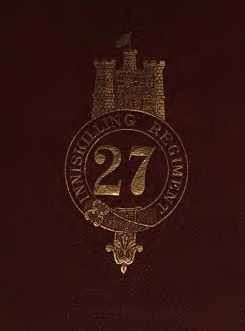Related Research Articles
The 77th Regiment of Foot (Montgomerie's Highlanders) was a Highland Scots Regiment raised in 1757. The 77th Regiment was one of the first three Highland Regiments to fight in North America. During the Seven Years' War, the regiment lost 110 soldiers and 259 were wounded.

The 27th (Inniskilling) Regiment of Foot was an Irish infantry regiment of the British Army, formed in 1689. Under the Childers Reforms it amalgamated with the 108th Regiment of Foot to form the Royal Inniskilling Fusiliers in 1881.

The 67th Regiment of Foot was a line infantry regiment of the British Army, raised in 1756. Under the Childers Reforms it amalgamated with the 37th Regiment of Foot to form the Hampshire Regiment in 1881.
The 100th Regiment of Foot, also known as Campbell's Highlanders, was an infantry regiment of the British Army, formed in 1760 and disbanded in 1763.
The 88th Regiment of Foot (Highland Volunteers), or Campbell's Highlanders, was a Scottish infantry regiment in the British Army, formed in 1760 and disbanded in 1763.
The 87th Regiment of Foot (Keith's Highlanders) was a Scottish infantry regiment in the British Army, formed in 1759 and disbanded in 1763.

The 119th Regiment of Foot was an infantry regiment of the British Army, formed in 1761 by the regimentation of independent companies and disbanded in 1763.
The 48th (Northamptonshire) Regiment of Foot was a regiment of the British Army, raised in 1741. Under the Childers Reforms it amalgamated with the 58th (Rutlandshire) Regiment of Foot to form the Northamptonshire Regiment in 1881.
The 115th Regiment of Foot (Royal Scotch Lowlanders) was an infantry regiment of the British Army from 1761 to 1763.
The 114th Regiment of Foot (Royal Highlander Volunteers) was an infantry regiment of the British Army from 1761 to 1763.It was raised in October 1761, by Sir Allan MacLean of Torloisk. He was commissioned lieutenant in the 60th Foot Royal Americans at the beginning of the Seven Years' War and was severely wounded at Ticonderoga in 1758. He was then given one of the four NY Independent Companies until he returned to Scotland where he raised the 114th Maclean's Highlanders, or the Royal Highland Volunteers, as their Major Commandant. The regiment was disbanded in 1763.
The 101st Regiment of Foot, or Johnston's Highlanders, was an infantry regiment of the British Army, formed in 1760 and disbanded in 1763. The regiment was raised in 1760 by the regimentation of independent companies of infantry raised in Argyll and Ross-shire; in 1761 it was moved into England, and its other ranks drafted to the 87th and 88th Foot.
The 110th Regiment of Foot (Queen's Royal Musqueteers) was an infantry regiment of the British Army from 1761 to 1763.
The 109th Regiment of Foot was an infantry regiment of the British Army from 1761 to 1763.
The 106th Regiment of Foot (Black Musqueteers) was an infantry regiment of the British Army that existed from 1761 to 1763. While the regiment operated during the Seven Years' War, it was deployed only in the British Isles, specifically in the southwest of England.
The 94th Regiment of Foot was a British Army regiment formed in Wales in January 1760. It saw action in North America later in the year during the French and Indian War and then took part, alongside the Royal Marines, in the Capture of Belle Île in April 1761 during the Seven Years' War, before sailing for the West Indies later in the year. In the West Indies it took part in the Invasion of Dominica in June 1761. The invasion was led by Lord Rollo who had been appointed by Lord Amherst to take command. The regiment went on to take part in the Invasion of Martinique in January 1762. It was disbanded in 1763.
The 75th Regiment of Foot was an infantry regiment of the British Army from 1758 to 1763.
The 72nd Regiment of Foot was a regiment in the British Army from 1758 to 1763.
The 71st Regiment of Foot was a regiment in the British Army from 1758 to 1763.
The 90th Regiment of Foot was a short-lived infantry regiment in the British Army which was raised in Ireland as a light infantry corps in 1759, during the Seven Years' War with France.
The 83rd Regiment of Foot (1757–1763) was a short-lived infantry regiment in the British Army which was raised in Ireland in 1757 to counter the Spanish Invasion of Portugal of 1762, an offshoot of the Seven Years' War.
References
- 1 2 "108th Regiment of Foot". regiments.org. Archived from the original on 11 October 2007.